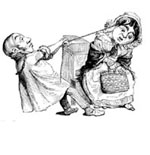
Education & the Ideology of Choice
LIFE IN A STYROFOAM WORLD
My coffee is hot, the Styrofoam cup tells me in three different languages. How fortunate I am to live in a society that takes the time and expense to provide informative tidbits like this, without which my day would be far more difficult. In the restaurant bathroom, a sign tells me how to change my kid’s diaper, another reminds me to wash my hands, and a third tells me the way out. Packaging labels contain lines and lines of information — how to remove a lid, what’s inside, when and where it was made, possible side effects, warnings to pregnant women. Cereal boxes! What a wealth of space! Right here on my Nature Valley Granola box I have all sorts of facts about the Spunky Bottoms wetlands and the American Bald Eagle. And let’s not neglect to mention the mother lode of all information sources, the Internet, which has the whole world talking about dot this and dot that, and accessing and downloading, while simultaneously diminishing our tolerance for depth and delay.
Even our schools are becoming information systems. Notice how history courses have been replaced by social studies courses which impart, not a thematic narrative of a people’s life, but spots of information on climate, culture, the economy, and topography. Reading or literature courses are also predominantly informative, including the author’s biography, historical setting of the work, and basic summaries of what happened. Math programs, such as the Saxon series, include no math theory; instead, they offer a purely functional, ask-no-questions approach. Religion courses, if they exist, are often lacking doctrine; they teach about the human phenomenon of religion, not about God and His revelation.
Perhaps in the proliferation of all these glorious tidbits and facts there is nothing that should trouble me; after all, they’re neutral. Yet, I think it’s their claim to neutrality that most disturbs me. In a recent gubernatorial campaign I began to see why. In the Detroit area, during the campaign, a philosophical/ontological issue arose in connection with one candidate, Jennifer Granholm, a member of a local Catholic parish. Apparently, Ms. Granholm has been in utter anguish over the possibility of voters believing that she takes her Catholicism seriously. Law is law, she told the public, religion is a private affair. Keeping with her distinctions between private and public, she added (almost needlessly) that while she’s personally opposed to abortion, she remains in favor of Roe v. Wade and “choice.”
Well, all this is par for the course. The new element in the Granholm scenario, though, was her parish’s defense of its politically famous lady. The Associate Pastor editorialized in the parish bulletin that “Christians are pro choice in the purest sense of the term” and that “choice in itself is a blessed gift.” Those Catholics who condemn Granholm’s prochoice position “would have the state legislate the freedom that only God can give.”
This Associate Pastor’s baptizing of choice jibes with current modes of popular thought. “Choice” is used as a sales pitch for foods, phone companies, schools, room décor, insurance plans, family size, etc. Even gender is becoming a multiple choice proposition. Ask any average student for a definition of freedom, and he’ll respond, “the ability to choose what you want.”
You May Also Enjoy
The inflated paper value of our corporate structure as reflected in stocks has not the remotest connection to real capital.
The U.S. bishops did not intend to suggest that Catholics who vote for a pro-choice candidates are putting their souls in jeopardy.
Reviews of The Death of the West... The Long Truce: How Toleration Made the World Safe for Power and Profit... Love and Economics: Why the Laissez-Faire Family Doesn't Work... Cardinal Ratzinger: The Vatican's Enforcer of the Faith... The Red Horse... Triumph: The Power and the Glory of the Catholic Church — A 2,000-Year History

